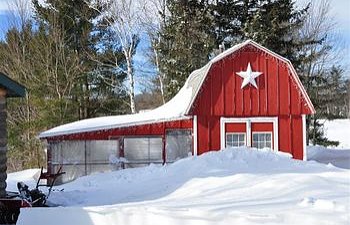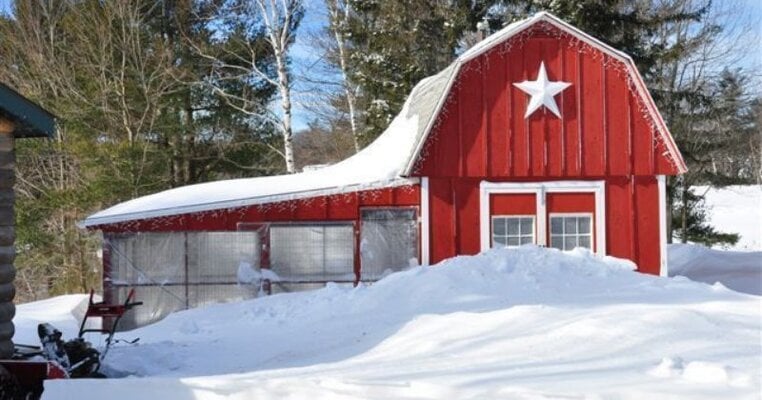Keeping chickens over winter
Keeping chickens safe and healthy over the colder months is a big concern for their keepers as winter and the extreme weather conditions experienced in certain parts of the world can cause problems such as frostbite and in some cases losses of birds. Here are some things you can do to get your flock through winter safely:Protect from adverse weather conditions
If possible, and weather permits, your flock should be allowed as much "outside time" as possible. Most chickens will be perfectly happy running around in the snow, they don't have to spend the colder months cooped up. Whether in a covered run or free-ranging, they must have an adequate shelter where they can hide from snowstorms and wind though if allowed outside.Coop insulation
Whether or not to insulate is a hotly debated topic here, with no clear or definite answer. Keep in mind that chickens over the age of 6-7 weeks do come with built-in insulation, in the form of a well-designed feather blanket that helps them regulate their body heat. Some less cold-hardy breeds may benefit from extra protection against extreme colds, but most hardy breeds will do fine in well-built, properly-ventilated coops and will not need insulation or extra heat unless the winter is extremely harsh. Here are some more information and opinions on the topic:https://www.backyardchickens.com/a/coop-insulation
https://www.backyardchickens.com/a/insulating-your-chicken-coop
Heating the coop
Personally, I am not a fan of supplemented heat, unless it's for small chicks, molting, or sick birds. Honestly, in most cases, the chickens really do not need it. They are designed to live outdoors in all seasons and have done so for many years. One potential problem with supplemented heat is: what if the power goes out? Chickens will have a problem acclimatizing to the drop from toasty warm to freezing temperatures if they lose their heat source suddenly and this can cause a range of health problems.Then there is the risk of coop fires which should be taken into account when considering this option. Many chicken keepers have tragically lost their flocks due to coop fires started by faulty electrics or knocked-over heat lamps. If you feel you have to provide some extra heating, for the reasons I listed above or others, be very careful and follow the guidelines listed in this article on fire safety in the coop and barn. You can help keep the coop comfortable for your flock by spreading a nice layer of straw around for them. This will act as insulation and also give them something to do.
Coop ventilation
This is probably the most important factor when it comes to kitting out and designing your winter coop. Adequate ventilation is vital! Good ventilation helps keep the moisture levels in the coop down, which will in turn reduce, or eliminate the risk of frostbite. A good tip from the old-timers: If the windows of the coop have frost stuck on the inside windows you need to provide more ventilation. Aim to provide as much ventilation as needed without making the coop draughty. For more on coop ventilation, I highly recommend this excellent article on the topic.Frostbite prevention
Certain breeds are more susceptible to frostbite, for example, the large comb breeds like Leghorns, while smaller pea comb breeds have a lesser risk, but all chickens, regardless of breed, are susceptible! To reduce or eliminate the risks of frostbite:- Keep the bedding in the coop as dry as possible and the humidity levels in the coop low, first of all by ensuring adequate ventilation (see above). Do not leave waterers inside the coop overnight as they will add to the overall humidity. Prevent water spillage as much as possible and clean and dry up the area, removing any damp bedding, if it does occur.
- Provide wide roosting bars (2x4 inch planks with the 4-inch side up is recommended), so that the chickens can tuck their feet in when sleeping. Discourage sleeping on the floor of the coop, especially on damp bedding.
Feeding and watering your flock
Chickens who normally free-range will miss and welcome some extra greens in the colder winter months when foraging is out of the question. Spinach, kale, and chard in moderate amounts will be appreciated, as well as spouts. If they don't have access to soil, make sure they have adequate grit available during this time! Some flock owners supplement their chickens' diet with treats such as BOSS (black oil sunflower seeds), and some provide snacks (and entertainment) in the coop in the form of homemade flock blocks, hanging cabbages, or apples in the coop.Do practice moderation when feeding snacks and extras and make sure it's never more than 10% of the flock's total feed intake. Chickens will need some extra energy to help them stay warm in winter but do not go overboard with feeding, especially corn, which could be scattered around the run, giving them something to scratch and look for, but it needs to be fed in moderate amounts only.
Keeping the chickens' water from freezing during the colder days and nights can be a challenge. BYC members have come up with some great ideas to work around this problem. Here are some discussions and tips:
https://www.backyardchickens.com/t/488529/methods-for-keeping-water-from-freezing/0_30
https://www.backyardchickens.com/a/cookie-tin-heater-for-water (Article on how to make your own)
https://www.backyardchickens.com/t/839187/water-freezing/0_30
https://www.backyardchickens.com/t/107951/cookie-tin-water-heater/0_30
Egglaying in winter
Most hens need at least 14 hours of light per day to keep them in production and will slow down, or stop laying completely, once the short winter days set in. For this reason, many chicken owners artificially extend their days by providing electric light in the coop. The light need not be very bright, just enough to read a newspaper by, and if provided should be turned on in the mornings, so as to not interfere with their normal roosting behavior.Keep in mind that though it's lovely to have fresh eggs year-round, there are serious downsides to providing artificial light during winter to keep them producing at a high rate. It has been linked to reproductive cancers in hens and by forcing them to continue laying without a break over winter, you could be severely shortening their lives.
Some further recommended reading:


